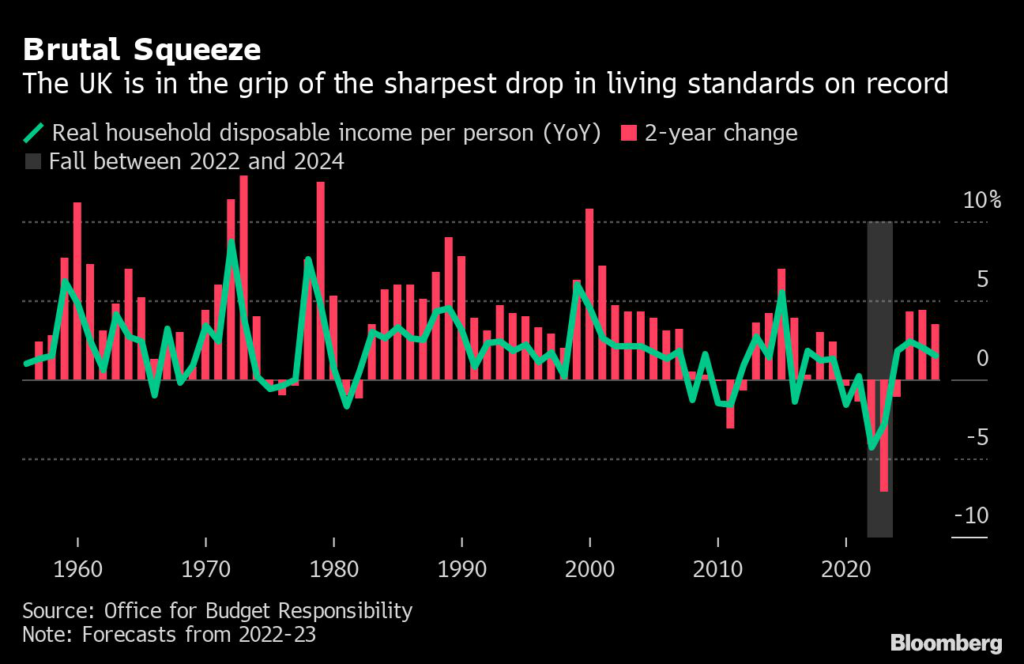UK inflation dipped for a second month in December, boosting hopes that the worst cost-of-living crisis in a generation may be starting to ease.
(Bloomberg) — Sign up for the New Economy Daily newsletter, follow us @economics and subscribe to our podcast.
UK inflation dipped for a second month in December, boosting hopes that the worst cost-of-living crisis in a generation may be starting to ease.
Consumer prices rose 10.5% from a year earlier, the Office for National Statistics said Wednesday. That’s slower than the 10.7% gain in November and a peak above 11% in October, when domestic energy bills surged.
The data “suggests the peak has now passed” for inflation, said David Bharier, head of research at the British Chambers of Commerce. “But this simply means that prices will stabilize at a much higher level than one year ago.”
Inflation remains five times higher than the government’s 2% target and has touched off a wave of strikes by public sector workers angry their wages are falling short of the pace of price increases. Prime Minister Rishi Sunak has made halving inflation one of his five key pledges for the year.
The figures are the last Bank of England officials will see before their next interest rate decision in February. Some economists are starting to talk about an end to the BOE’s tightening cycle, which has delivered the fastest rate rises in three decades.
“Falling inflation will come as a relief to Bank of England’s policymakers who may see this as an opportunity to slow the pace of further rate rises,” said Yael Selfin, chief economist at KPMG UK.
The pound rose to the day’s high, advancing as much as 0.3% to $1.2320, reflecting optimism that the UK economy may not be hit as hard as forecasters had previously thought. The headline inflation rate was in line with economist expectations.
What Bloomberg Economics Says …
“December’s drop in UK inflation is unlikely to deter the majority of Bank of England policy makers from delivering another 50 basis-point hike next month. Core inflation is proving sticky, which alongside rapid wage growth, elevated expectations and a more resilient economy, suggests price pressure could prove more persistent. We see the benchmark rate peaking at 4.25% in March, but there’s an increasing risk it will need to go higher to bring inflation down.”
—Dan Hanson and Ana Andrade, Bloomberg Economics. Click for the REACT.
Chancellor of the Exchequer Jeremy Hunt said he has more to do to bring down the cost of living.
“High inflation is a nightmare for family budgets, destroys business investment and leads to strike action, so however tough, we need to stick to our plan to bring it down,” Hunt said in a statement. “While any fall in inflation is welcome, we have a plan to go further.”
The cost of motor fuels fell along with the price of clothing and shoes. Food costs accelerated at the quickest pace since records started in 1989, a worry for low-income families who spend a greater proportion of their income on essentials such as food.
“Inflation eased slightly in December, although still at a very high level,” said ONS Chief Economist Grant Fitzner. “However, this was offset by increases for coach and air fares as well as overnight hotel accommodation. Food costs continue to spike with prices also rising in shops, cafés and restaurants.”
Underscoring concerns about persistent inflation, a core measure of prices that excludes energy, food, alcohol and tobacco prices, was unchanged at 6.3%. Inflation in the services sector accelerated to 6.8%.
High inflation in the services sector may mean that rising prices prove stickier than thought as higher wage expectations become embedded, said Marcus Brookes, chief investment officer at Quilter Investors.
“For those hoping that inflation would simply just fall out of the system quickly, that is a scenario that is unlikely to come to fruition,” Brookes said. “Services are now driving inflation as companies have had to increase wages just to get staff on their books.”
Fuel prices were 11.5% higher in December compared to a year earlier, down from 17.2% in November. The ONS said that prices at the pump fell by 8.3 pence per liter between November and December.
The price of games, toys and hobbies, fell 3.8% from November.
The central bank has raised interest rates nine times in a row since December 2021 and is expected to deliver a further half-point to 4% next month. Investors anticipate rates to peak at around 4.5% by mid-year.
Officials are trying to avert a wage-price spiral where workers bid up salaries because they expect high inflation to persist, prompting firms to raise prices further. While inflation is slowing, it remains close to four-decade highs and is unlikely to return to target until well into 2024 or beyond.
“Today’s inflation print will add to the pressure on UK policymakers to demonstrate that they are serious about tackling price pressures,” said Hugh Gimber, global market strategist at JPMorgan Asset Management.
–With assistance from Brendan Scott and Harumi Ichikura.
(Updates with with comment and core inflation from third paragraph.)
More stories like this are available on bloomberg.com
©2023 Bloomberg L.P.










